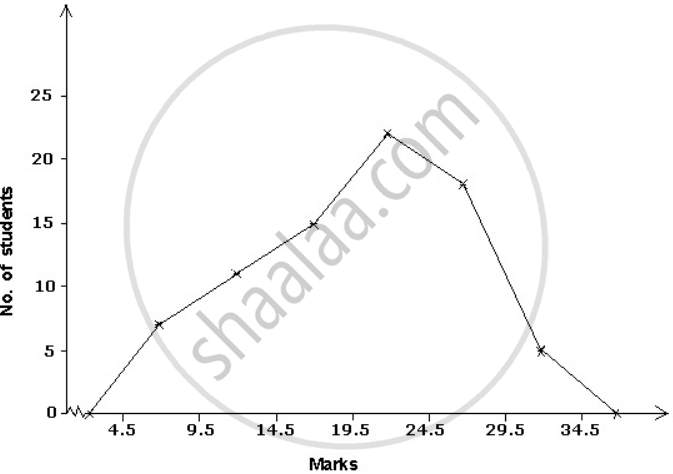Advertisements
Advertisements
प्रश्न
Draw a frequency polygon for the following data:
| Marks | 5 - 9 | 10 - 14 | 15 - 19 | 20 - 24 | 25 - 29 | 30 - 39 |
| No. of students | 7 | 11 | 15 | 22 | 18 | 5 |
उत्तर
We see that the class intervals are in an inclusive manner. We first need to convert them into exclusive manner.
| Marks | No. of students |
| 4.5 - 9.5 | 7 |
| 9.5 - 14.5 | 11 |
| 14.5 - 19.5 | 15 |
| 19.5 - 24.5 | 22 |
| 24.5 - 29.5 | 18 |
| 29.5 - 34.5 | 5 |
We take the class limits on the x-axis and the frequencies on the y-axis on suitable scales.
Now, find class marks of all the class intervals. Locate the points (x1, y1) on the graph, where x1 denotes the class mark and y1 denotes the corresponding frequency. Join all the points plotted above with straight line segments. Join the first point and the last point to the points representing class marks of the class intervals before the first class interval and after the last class interval of the given frequency distribution.
Here as the class limits do not start from 0, we put a kink between 0 and the lower boundary of the first class.
APPEARS IN
संबंधित प्रश्न
Fadil, a class IX student, scored marks in different subjects (each out of total 100) during his annual examination as given below:
| Subject | Maths | English | Science | Social studies | Hindi | Physical education |
| Mark (out of 100) | 75 | 80 | 77 | 78 | 67 | 89 |
Draw horizontal bar graph for the above data.
The number of students in different sections of class IX of a certain school is given in the following table.
| Section | IX-A | IX-B | IX-C | IX-D | IX-E |
| Number of students | 48 | 40 | 50 | 45 | 38 |
Draw horizontal bar graph for the above data.
Draw a histogram for the following frequency distribution:
| Train fare | 0 - 50 | 50 - 100 | 100 - 150 | 150 - 200 | 200 - 250 | 250 - 300 |
| No. of travellers | 25 | 40 | 36 | 20 | 17 | 12 |
The following frequency distribution table shows the cost of living in a city in a period of 2years. Draw histogram for this frequency distribution:
| Cost of living | 2000 - 2500 | 2500 - 3000 | 3000 - 3500 | 3500 - 4000 | 4000 - 4500 | 4500 - 5000 | 5000 - 5500 | 5500 - 6000 |
| No. of months | 3 | 4 | 2 | 5 | 3 | 2 | 4 | 1 |
Draw a histogram for the following frequency table:
| Class interval | 5 - 9 | 10 - 14 | 15 - 19 | 20 - 24 | 25 - 29 | 30 - 34 |
| Frequency | 5 | 9 | 12 | 10 | 16 | 12 |
Draw a histogram for the following cumulative frequency table:
| Class interval | 0 - 10 | 10 - 20 | 20 - 30 | 30 - 40 | 40 - 50 |
| Cumulative frequency | 6 | 10 | 18 | 32 | 40 |
Draw a histogram and a frequency polygon for the following data:
| Marks | 0 - 20 | 20 - 40 | 40 - 60 | 60 - 80 | 80 - 100 |
| No. of students | 12 | 18 | 30 | 25 | 15 |
Draw a histogram and a frequency polygon for the following data:
| Wages | 150 - 200 | 200 - 250 | 250 - 300 | 300 - 350 | 350 - 400 | 400 - 450 |
| No. of workers | 25 | 40 | 35 | 28 | 30 | 22 |
Draw a frequency polygon for the following data:
| Expenses | 100 - 150 | 150 - 200 | 200 - 250 | 250 - 300 | 300 - 350 | 350 - 400 |
| No. of families | 22 | 37 | 26 | 18 | 10 | 5 |
Draw a frequency polygon for the following data:
| Class | 15 - 20 | 20 - 25 | 25 - 30 | 30 - 35 | 35 - 40 | 40 - 45 |
| Frequency | 5 | 12 | 15 | 26 | 18 | 7 |
